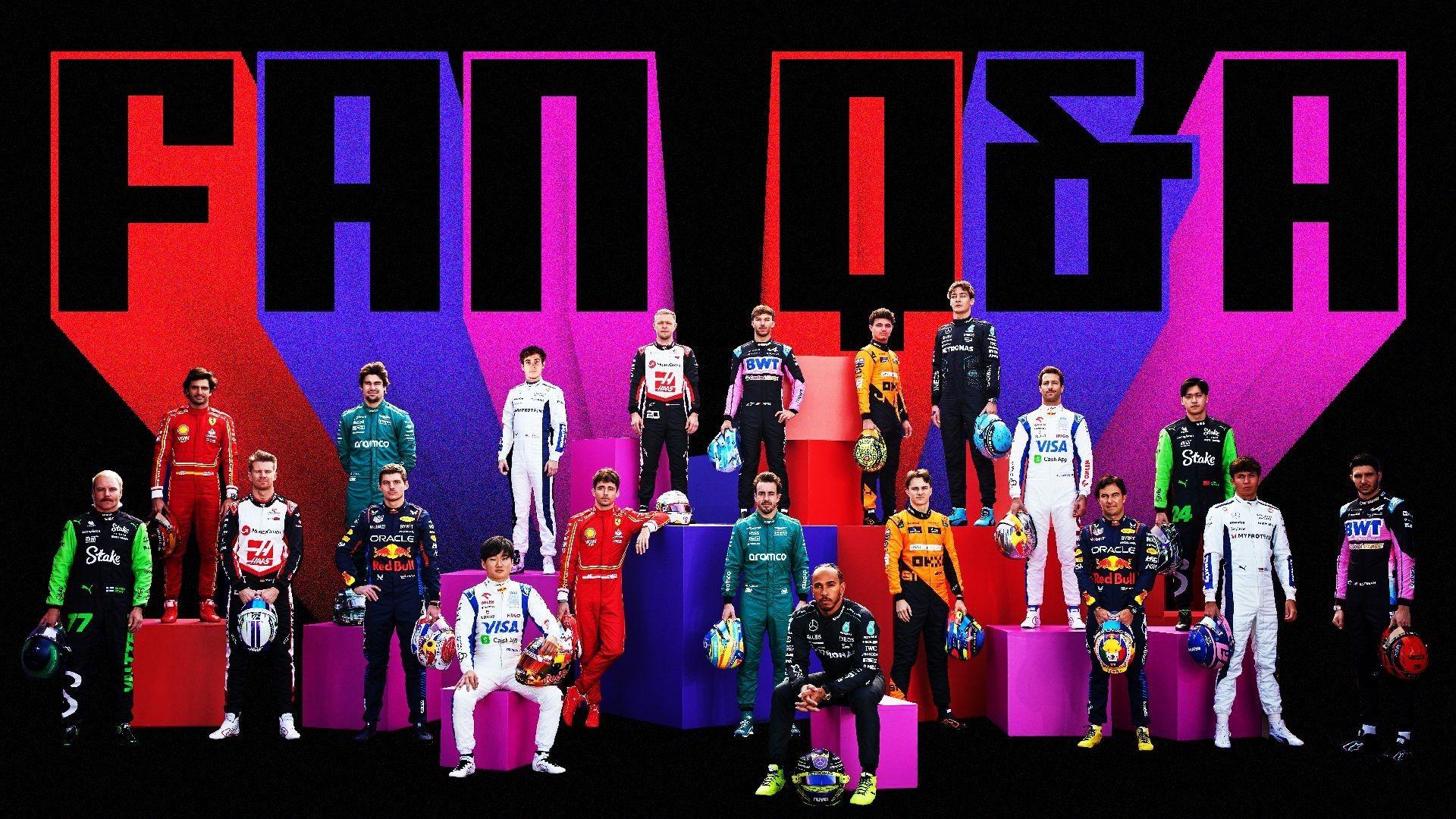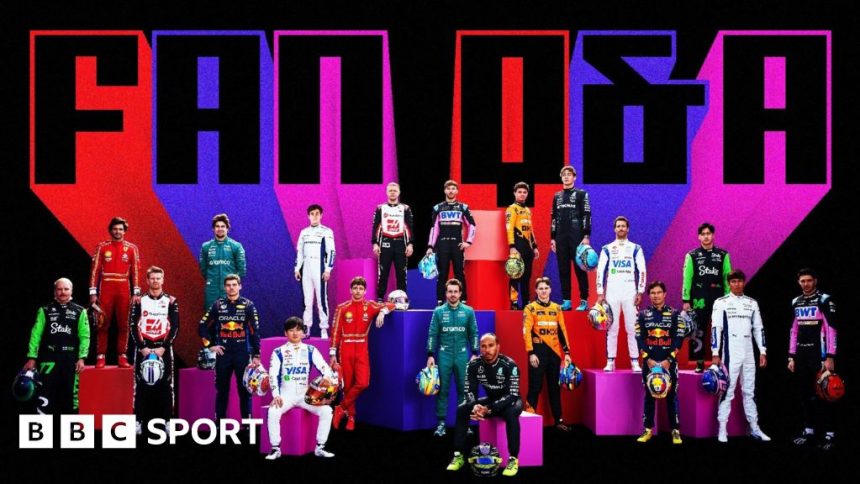F1 Q&A: Are there problems between drivers and the FIA?

-
Published
McLaren’s Lando Norris converted pole position to a race win in a dominant performance at the Singapore Grand Prix.
Red Bull’s Max Verstappen, who finished second, is now 52 points ahead of Norris with six races remaining in the season.
With a third-place finish for Oscar Piastri, McLaren extended their constructors championship lead to 41 points.
BBC F1 correspondent Andrew Benson answers your questions after the race in Marina Bay.
The censure Max Verstappen has got for swearing, and Lewis Hamilton’s comments on stereotypical language, does this show problems between drivers and the FIA? – John
Without question, yes.
On Saturday, when Verstappen staged his protest against the penalty by giving minimalist answers in the official FIA news conference, Lando Norris and Lewis Hamilton made it clear they thought the penalty was wrong.
On Sunday, after he did the same thing – and again spoke to the written media away from the FIA news conference room – Verstappen made it clear the drivers backed him as a group.
“Yeah, for sure,” he said. “Of course, I wrote in the GPDA [WhatsApp chat] the ruling, and everyone was almost laughing like, ‘What the hell is that?’ basically. So, yeah, it is very, very silly.”
And now Alex Wurz, the chairman of the Grand Prix Drivers’ Association, has said he believes the penalty was excessive too.
Wurz drew parallels with former Haas team principal Guenther Steiner, who became famous for swearing profusely on the Netflix Drive To Survive series – and has been celebrated for it.
“How many lifetime community services would Guenther Steiner have to serve for using the F-word? He was glorified for using the F-word,” he said.
“Netflix broadcast this worldwide, no problem. But then to suddenly change like that?
“I have to say, [the choice of words] is not my personal taste as a driver. As GPDA chairman, I have to officially say that we will, of course, discuss it internally, first reach a full consensus, and then we will consider whether and in what form we will talk to the FIA and the president.”
It’s important to say here that, within F1, there are different views on this.
Verstappen, along with many of his colleagues, feels not being able to swear occasionally in a news conference denies drivers of the ability to be authentic.
Others, though, while feeling the FIA has not handled this well at all, believe there is a time and a place for these things.
Swearing over the team radio while in the car is understandable, even to be expected, they feel. But equally, there is an expectation drivers should be aware of the sensitivities of broadcasting and measure their language in forums when the adrenaline is not running so high.
There is a wider issue, though. This all started from an interview done by FIA president Mohammed Ben Sulayem, in which he said he wanted F1 to limit swearing on TV broadcasts.
His language in the interview angered Lewis Hamilton, who called it “stereotypical” and said it had a “racial element”. Ben Sulayem’s general argument annoyed the drivers, which is probably why Verstappen swore in the original news conference – to make a point.
Many questioned why Ben Sulayem was wading into an area that, technically, has nothing to do with him – TV is the responsibility of the F1 commercial rights holder, Liberty Media.
Throughout F1, there is widespread discomfort at the way Ben Sulayem conducts himself, and the large number of controversies in which he has found himself involved during his tenure.
Verstappen is aiming to win a fourth consecutive title
Should Red Bull be allowed to use RB to strategically take the fastest lap and one point from Lando Norris? Isn’t this an unfair advantage? – Matt
The first thing to say here is that we don’t know whether Red Bull Racing had anything to do with this, even if many – including McLaren – had their suspicions.
RB said the decision to call Daniel Ricciardo in for fresh tyres to go for the fastest lap at the end of the Singapore Grand Prix was made because they were aware he might be dropped for Liam Lawson before the next race in the United States.
“If it was to be his last race, we wanted him to go out on a high,” a spokesperson said.
Ricciardo gave different messaging – he was well aware his actions helped Red Bull’s Verstappen by taking a point off his title rival.
“I guess it [could] help Max out by Abu Dhabi, so maybe there is a Christmas present coming if he wins by a point,” he added.
Verstappen, likewise, said he had to “thank” Ricciardo.
At McLaren, meanwhile, there was definite discontent. McLaren Racing chairman Zak Brown has been raising concerns about the relationship between Red Bull and their second team for some time, because of concerns it could be used to create an advantage for one or the other in some way.
And this is one example of how that could happen.
McLaren team principal Andrea Stella chose his words carefully after the race.
“I did not see it coming,” he said. “I was a little surprised that the highest priority of Racing Bulls’ racing in Singapore was to go and score the fastest lap of the race.
“At the same time, I have so much sympathy, support and friendship with Daniel that I am just happy that he may add this fastest lap to his track record.”
It was pointed out to Stella this could potentially come under the description of unsportsmanlike behaviour, which is forbidden in the sporting code and can lead to penalties.
He added: “Look, this is a big matter. As soon as you involve sportsmanship, you need to approach this with a sense of responsibility that I want to have.
“I don’t know the facts. I just saw Racing Bulls went for the fastest lap and they achieved it. To talk about sportsmanship here would be out of place.
“We have to take it at face value.”
But he did say he wanted discussions between stakeholders on the general topic of relationships between teams.
“Potentially as part of a longer term conversation, we have to put the sport in a position in which at any stage, being it trackside or being it factory side, teams behave in a totally autonomous manner, because this is a constructors’ championship, a drivers’ championship,” said Stella. “It’s not a coalition championship.
“Therefore this needs to be definitely addressed but at no point I have elements now to say Racing Bulls went for the fastest lap to support Red Bull. I just find it a little peculiar.”
RB’s Daniel Ricciardo finished the race in Singapore with the fastest lap
Given McLaren has been fastest for most of the season, if Verstappen does retain the title how would this achievement compare to Alain Prost in 1986? – Ross
This question is a reference to Alain Prost winning the 1986 title for McLaren while facing Williams drivers Nigel Mansell and Nelson Piquet, whose car was generally faster.
It is held up as one of the great seasons by a driver, and rightfully so.
Whether it is the only – or even the best example – of a driver outperforming his car’s capabilities over a season is a different question.
In 2012, for example, the Ferrari was only the fourth fastest car on average, and yet Fernando Alonso kept the title fight going to the final race – and was extremely unlucky to lose out to Red Bull’s Sebastian Vettel.
In fact, he only did so because he was taken out through no fault of his own in two races in the second half of the season, by Lotus driver Romain Grosjean in a start-line crash in Belgium, and when the front wing of Kimi Raikkonen’s Lotus punctured Alonso’s rear tyre at the first corner in Japan.
There is no doubt Verstappen is driving an outstanding season in 2024, but whether it is the same sort of situation as Prost in 1986 or Alonso in 2012 is questionable. Even if many would argue Verstappen could be an even better driver than either.
For a start, the Red Bull was without doubt the fastest car – by a mile – over the first five races of the season. That was never the case for Prost nor Alonso.
And the claim in the question that this year’s McLaren has been the fastest car “for most of the season” is also questionable.
Over the first half, the Red Bull was the fastest car in qualifying on average by 0.230 seconds. Verstappen won seven of the first 10 races, and took the first seven poles in a row. Remember too, that Verstappen was dominating Austria before his late pit stop went wrong, allowing Norris to catch up.
And while the McLaren may have been a match for it in many races from Miami onwards, it was rarely demonstrably, obviously faster.
Since Hungary, though, McLaren have definitely had an advantage on balance. Their average qualifying advantage over Red Bull since then is 0.213secs. And over the course of the season, Red Bull’s average advantage in qualifying is now down to 0.1secs.
But let’s not forget Verstappen qualified on pole in Belgium and probably would have won there had he not had a grid penalty for using too many engines.
Having said all that, Verstappen has definitely maximised the potential of his car over the season, operating at a consistently high level, in a way Norris has not. After the race on Sunday, the Briton himself admitted: “I’ve paid the price for not doing a good enough job at times.”
And, right now, if you were to do a straw poll in F1 as to who has had the better season, I’m pretty sure most would say Verstappen, and that he would therefore be a more deserving winner of the title.
But there are still six races to go. So let’s see where how things look at the end of the campaign.
If Mercedes sign Verstappen for 2026 and with Andrea Kimi Antonelli in the car for 2025, what will this mean for George Russell in 2026? – Leigh
Lots of “ifs” in that question, starting with whether Verstappen will leave Red Bull for Mercedes at the end of next season.
He is contracted to Red Bull until the end of 2028, but BBC Sport understands there are mechanisms within his contract that would allow him to leave in certain circumstances.
If he chose to do so, Mercedes had seemed the most likely destination for Verstappen – they had talks in the summer about a move for 2025, and Toto Wolff says he is keeping an “open” channel of communication with the Verstappens.
But now Adrian Newey is moving to Aston Martin – who will also have Honda engines in 2026 – might that be at least as tempting an opportunity for after Alonso’s contract expires in 2026? It could well be.
Were Verstappen to go to Mercedes in 2026, obviously one of Russell or Antonelli would have to move on.
That would put Wolff in quite the quandary. Would he simply choose the driver who had the best season in 2025? Well, Wolff says he expects that to be Russell, given Antonelli, 18, is so young and would be in only his first season.
But it would also mean Wolff giving up on a driver he has nurtured since he was 11. Would he do that?
One can see why it might be Antonelli who was kept on. But if Russell needs to find a seat, he won’t be short of options. Red Bull, for a start, would have a vacancy, and he would be right at the top of their list.
Antonelli is sixth in the F2 Championship with four races remaining in the 2024 campaign
Why are today’s cars so much more reliable than they were in the late 80s, early 90s? – Clare
It’s a combination of factors. Back in the 1980s, when all cars were unreliable, by extension it mattered less if one particular team’s was, as it would mostly even out by the end of the season.
But then certain teams started building in bullet-proof reliability – starting with Ferrari in the early 2000s – and so everyone else had to follow suit.
And before long, reliability was a key factor in championships – just ask Newey, whose McLaren cars suffered for Mercedes unreliability over a number of seasons, while Ferrari were dominating, and again in 2005.
As technology improved, control and monitoring of components became easier. So understanding that parts were reliable – and how to make them so – became easier.
A number of rules have changed, too, principally on the basis of limiting costs, which has further biased F1 towards reliability – such as the limit on the number of engines allowed per season and so on.
And on top of that, there is an image question. Major manufacturers don’t like their products to be seen to fail on such a massive global stage, so they try to make sure they don’t.






